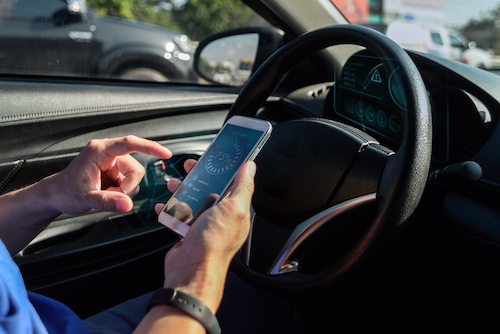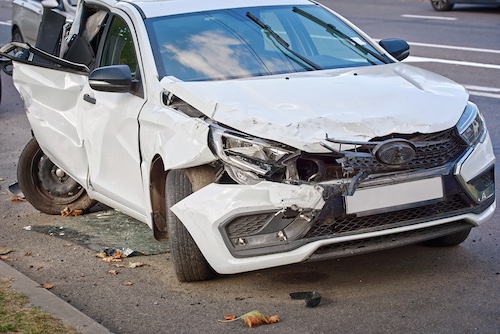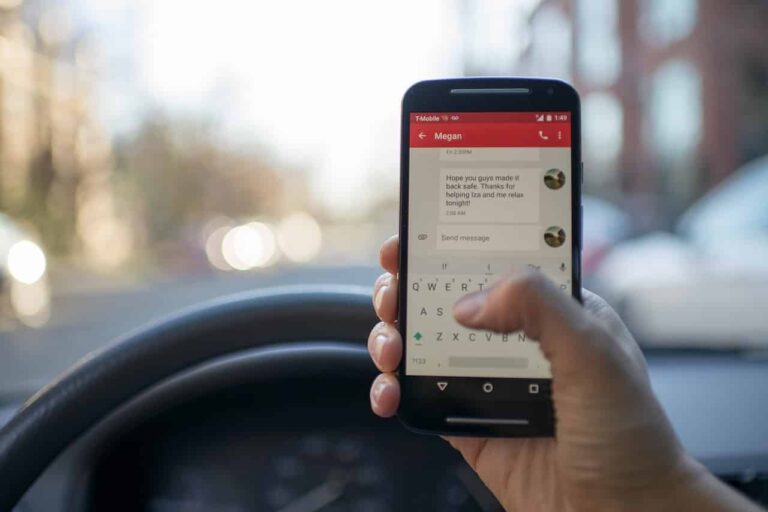- Car Accidents
Leslie has over 3 decades of civil litigation and trial experience for personal injury and family law. She is a member of the State Bar of Georgia litigation and family law sections.
Georgia Distracted Driving Law and Texting Accidents
At Wade Law Office, we focus on representing clients who suffer injuries in distracted driving accidents under Georgia distracted driving law. We serve Fayetteville, GA, and surrounding areas. Our team brings over 70 years of combined trial experience. We offer free case reviews and charge no fees unless we recover compensation for you. We work around the clock, and we tailor our support to your needs. You get straight answers, focused attention, and a team that knows local courts, law enforcement, and community dynamics.
Texting while driving is one of the most common causes of car accidents in Georgia, and the state has taken firm steps to reduce these dangerous behaviors. The Georgia distracted driving law, also known as the Hands Free Georgia Act, limits how drivers can use cell phones, text messaging devices, and other electronic devices while operating a motor vehicle. Despite these rules, distracted drivers continue to cause serious injuries and fatalities on Georgia roads.
Understanding what the law prohibits, the penalties for violations, and how a Fayetteville car accident lawyer can help after a crash is essential for anyone injured in these preventable accidents.
What Is Distracted Driving Under Georgia Law?
Distracted driving is one of the leading causes of crashes across the state. Georgia law clearly defines what counts as distracted driving and outlines what is considered prohibited conduct when a driver is operating a motor vehicle.
Definition of Distracted Driving
Under Georgia distracted driving law (O.C.G.A. § 40-6-241), a driver cannot engage in actions that prevent the safe operation of such a vehicle. This includes using a wireless telecommunications device or a standalone electronic device while in a seated driving position. Text-based communication, instant message use, or internet data entry while driving are all prohibited.
Prohibited Use of Devices
A driver cannot physically hold or support a cellular telephone, portable telephone, or text messaging device while driving. Watching video data files, music streaming apps, or continuously recording video for purposes other than in-vehicle security is also not allowed. The law treats each act of prohibited conduct as a separate offense.
Permitted Exceptions
The law recognizes certain exceptions. Use of a global positioning system receiver or a device used for global positioning system purposes is permitted. Drivers may also use voice based communication or hands free technology to receive communication safely. Emergency medical services personnel, a utility services provider acting during a utility emergency, or a law enforcement officer performing official duties may use such a device without penalty. Devices such as a citizens’ band radio, a ham radio device, or a prescribed medical device are also excluded.
Why the Law Matters
The Hands Free Georgia Act was passed to reduce accidents caused by distracted drivers. Limiting the use of electronic devices helps protect every person on the road. By enforcing these rules, the law encourages the safe operation of motor vehicles and reduces the risk of serious collisions.
Georgia Distracted Driving Law Explained
Georgia has strict laws in place to prevent distracted driving and promote the safe operation of motor vehicles. The rules under the Hands Free Georgia Act apply to all drivers and outline both prohibited conduct and permitted device use.
Core Prohibitions
According to state law, a driver cannot hold or support a cellular telephone, portable telephone, or any text messaging device while operating a vehicle in a seated driving position. Sending text-based communication, writing an instant message, or entering internet data while driving are all prohibited. Drivers are also barred from watching video data files or streaming entertainment that interferes with safe operation.
Use of Hands-Free Technology
The law allows drivers to use hands-free technology and voice based communication for calls and messages. A global positioning system receiver or a device used for global positioning system purposes is also permitted. Systems like continuously running dash cams, remote diagnostics system features, and in-vehicle security are allowed since they do not require direct interaction while driving.
Specific Exclusions
Some device uses are excluded from such prohibition. A prescribed medical device, citizen’s band radio hybrid, or ham radio device is not restricted. A utility services provider acting during a utility emergency or a law enforcement officer performing official duties may use such a device. Emergency medical services personnel are also exempt when responding to a medical emergency.
Penalties for Violations
A person convicted of violating the distracted driving statute faces fines and points on their driving record. A second conviction results in higher penalties, and a third or subsequent conviction brings steeper fines and possible license consequences. Each separate offense is treated as an independent violation.
Penalties and Consequences for Violations
Violating the Georgia distracted driving law carries legal and financial consequences that increase with each offense. The penalties are structured to discourage repeated violations and to protect the safe operation of motor vehicles.
First Conviction
A first conviction results in a fine of $50 and the addition of one point to the driving record of such driver. The offense is recorded and remains part of the driver’s history. This warning stage is meant to prevent further violations.
Second Conviction
A second conviction within 24 months leads to a $100 fine and two points added to the driving record. Insurance providers may also raise rates based on such offense. The higher penalty signals that repeated violations will not be treated lightly.
Third or Subsequent Conviction
A third or subsequent conviction within 24 months results in a $150 fine and three points on the driving record. At this level, the driver is considered a habitual distracted driver and faces stronger legal and financial pressure to change behavior. Each conviction thereof is treated as a separate offense.
Impact on Drivers
Points from these violations can combine with other offenses, leading to license suspension for such person. Commercial motor vehicle operators and novice drivers face stricter scrutiny under Georgia’s hands-free law. The law applies equally across age groups and occupations, with limited exclusions for law enforcement officer duties, utility emergency response, or emergency medical services personnel.
Why Texting While Driving Leads to Serious Accidents
Texting while driving is one of the most dangerous forms of distracted driving because it removes a driver’s eyes, hands, and focus from the safe operation of a motor vehicle.
Visual and Manual Distraction
A driver who looks at a cellular telephone or text messaging device is not watching the road. Even a few seconds of reading or typing a message can cause the vehicle to drift into another lane or collide with another car. Taking hands off the wheel to use such device makes the driver slower to react in a sudden stop or traffic change.
Cognitive Interference
Text based communication demands thought and attention. A distracted driver who reads or composes an instant message cannot fully process road signs, traffic signals, or changing conditions. This mental split increases the chance of missing hazards such as a stopped vehicle, a pedestrian, or a safety belt warning.
Increased Crash Risk
Studies show that drivers using electronic devices are far more likely to be involved in collisions. Watching video data files, entering internet data, or switching music streaming apps while driving can all delay reaction time. The Hands Free Georgia Act was written to reduce these behaviors because they directly cause preventable crashes.
Real-World Consequences
Distracted driving accidents often lead to severe injuries. Victims may suffer broken bones, head trauma, or spinal damage, even when properly restrained by a seat belt. In fatal cases, the violation of such prohibition becomes clear evidence of negligence. A distracted driver risks not only fines and a conviction thereof but also civil liability for the harm caused.
How a Fayetteville Car Accident Lawyer Can Help
A distracted driving accident can leave you facing medical bills, lost income, and stress, but a Fayetteville car accident lawyer can guide you through every step of your recovery.
Immediate Case Review
We offer a free case review. We assess your claim quickly. We work on cases 24/7. You pay no fee unless we win. Our firm brings over 70 years of trial experience and a focus on personal attention.
Gathering Evidence of Distracted Driving
Our team collects evidence of prohibited conduct. We obtain phone records, instant message logs, or internet data usage to show the driver’s distracted state. We review in-vehicle technology like dash cams or remote diagnostics systems, where allowed under Georgia law.
Securing Compensation
We calculate your losses precisely. We include medical bills, lost wages, pain and suffering, and any long-term effects. Our goal is to secure full compensation under Georgia law, including cases with delayed injuries.
Navigating Legal Deadlines
We ensure you meet all deadlines, such as the two-year statute of limitations for personal injury claims in Georgia. Missing that window can cost your legal rights.
Court Representation When Needed
If insurance companies refuse fair offers, our team is ready for trial. We leverage decades of trial experience and in-court tactics to protect your rights and demand fair results.
Personalized Support and Local Knowledge
We serve the Fayetteville GA community. We handle each case with care and focus on your priorities. We know local courts, judges, and law enforcement practices.
Speak With a Fayetteville Car Accident Lawyer Today!
If you or a loved one has been injured by a distracted driver, our team at Wade Law Office is ready to help. We will investigate the accident, gather evidence under the Georgia distracted driving law, and fight for the compensation you deserve. Do not wait to protect your rights.
Contact us at 770-282-1188 for a free case consultation today!












